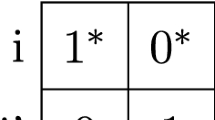Abstract
In this paper, we study the risk-sensitive average payoff criterion for the nonzero-sum discrete-time stochastic games with a denumerable state space. The risk-sensitivity coefficient can take positive values and negative values. Under the suitable conditions, we show the existence of a solution to the coupled equations by a technique of the discounted approximation, and obtain the existence of a stationary Nash equilibrium. Moreover, we present some verifiable sufficient conditions imposed on the primitive data of the model for the verification of our assumption and use an example to illustrate that our conditions are weaker than those in the existing literature.
Similar content being viewed by others
References
Aliprantis C, Border K (2007) Infinite dimensional analysis. Springer, New York
Basu A, Ghosh MK (2014) Zero-sum risk-sensitive stochastic games on a countable state space. Stoch Process Appl 124:961–983
Basu A, Ghosh MK (2018) Nonzero-sum risk-sensitive stochastic games on a countable state space. Math Oper Res 43:516–532
Bäuerle N, Rieder U (2017) Zero-sum risk-sensitive stochastic games. Stoch Process Appl 127:622–642
Bertsekas DP, Shreve SE (1996) Stochastic optimal control: the discrete-time case. Athena Scientific, Belmont
Cavazos-Cadena R (2009) The risk-sensitive Poisson equation for a communicating Markov chain on a denumerable state space. Kybernetika 45:716–736
Cavazos-Cadena R (2010) Optimality equations and inequalities in a class of risk-sensitive average cost Markov decision chains. Math Methods Oper Res 71:47–84
Cavazos-Cadena R, Hernández-Hernández D (2011) Discounted approximations for risk-sensitive average criteria in Markov decision chains with finite state space. Math Oper Res 36:133–146
Di Masi GB, Stettner L (1999) Risk-sensitive control of discrete-time Markov processes with infinite horizon. SIAM J Control Optim 38:61–78
Di Masi GB, Stettner L (2000) Infinite horizon risk sensitive control of discrete-time Markov processes with small risk. Syst Control Lett 40:15–20
Di Masi GB, Stettner L (2007) Infinite horizon risk sensitive control of discrete time Markov processes under minorization property. SIAM J Control Optim 46:231–252
Filar J, Vrieze K (1997) Competitive Markov decision processes. Springer, New York
Hernández-Hernández D, Marcus SI (1999) Existence of risk-sensitive optimal stationary policies for controlled Markov processes. Appl Math Optim 40:273–285
Hernández-Lerma O, Lasserre JB (1996) Discrete-time Markov control processes: basic optimality criteria. Springer, New York
Hernández-Lerma O, Lasserre JB (1999) Further topics on discrete-time Markov control processes. Springer, New York
Howard RA, Matheson JE (1972) Risk-sensitive Markov decision processes. Manag Sci 18:356–369
Jaśkiewicz A (2007) Average optimality for risk-sensitive control with general state space. Ann Appl Probab 17:654–675
Nowak AS (2003) On a new class of nonzero-sum discounted stochastic games having stationary Nash equilibrium points. Intern J Game Theory 32:121–132
Nowak AS (2007) On stochastic games in economics. Math Methods Oper Res 66:513–530
Pratt JW (1964) Risk-aversion in the small and in the large. Econometrica 32:122–136
Puterman ML (1994) Markov decision processes: discrete stochastic dynamic programming. Wiley, New York
Wei QD, Chen X (2015) Constrained stochastic games with the average payoff criteria. Oper Res Lett 43:83–88
Weil P (1993) Precautionary savings and the permanent income hypothesis. Rev Econ Stud 60:367–383
Acknowledgements
The authors are greatly indebted to the referees for the valuable comments and suggestions which have greatly improved the presentation. The research of the first author was supported by National Natural Science Foundation of China (Grant No. 11601166) and Cultivation Program for Outstanding Young Scientific Talents of Fujian Province. The research of the second author was supported by National Natural Science Foundation of China (Grant No. 11701483) and the Fundamental Research Funds for the Central Universities of Xiamen University (Grant No. 20720170008).
Author information
Authors and Affiliations
Corresponding author
Rights and permissions
About this article
Cite this article
Wei, Q., Chen, X. Risk-Sensitive Average Equilibria for Discrete-Time Stochastic Games. Dyn Games Appl 9, 521–549 (2019). https://doi.org/10.1007/s13235-018-0267-5
Published:
Issue Date:
DOI: https://doi.org/10.1007/s13235-018-0267-5




